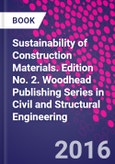This book provides comprehensive and detailed analysis of the sustainability issues associated with these materials, mainly in relation to the constituent materials, processing, recycling, and lifecycle environmental impacts.
The contents of each chapter reflect the individual aspects of the material that affect sustainability, such as the preservation and repair of timber, the use of cement replacements in concrete, the prevention and control of metal corrosion and the crucial role of adhesives in wood products.
Please Note: This is an On Demand product, delivery may take up to 11 working days after payment has been received.
Table of Contents
1. Introduction 2. Principles of sustainability and life-cycle analysis 3. Intrinsic properties controlling the sustainability of construction 4. Nanotechnologies for sustainable construction 5. Sustainability of glass in construction 6. Sustainability of metals and alloys in construction 7. Sustainability of timber and wood in construction 8. Sustainability of engineered wood products 9. Sustainability of aggregates in construction 10. The sustainability of lightweight aggregates manufactured from clay wastes for reducing the carbon footprint of structural and foundation concrete 11. Sustainability of masonry in construction 12. Sustainability of natural stone as a construction material 13. Sustainability of compressed earth as a construction material 14. Sustainability of bituminous materials 15. Sustainability of cement, concrete and cement replacement materials in construction 16. Durability of sustainable construction materials 17. Low clinker cement as a sustainable construction material 18. Sustainability of alkali-activated cementitious materials and geopolymers 19. Sustainable use of vegetable fibres and particles in civil construction 20. Sustainability of fiber-reinforced polymers (FRPs) as a construction material 21. Sustainability of fibre composite concrete construction 22. Sustainability of wastepaper in construction 23. Sustainability of using waste rubber in concrete 24. Sustainability of sewage sludge in construction 25. Sustainability of gypsum products as a construction material 26. Sustainability of desulphurised (FGD) waste in construction 27. Conclusion








